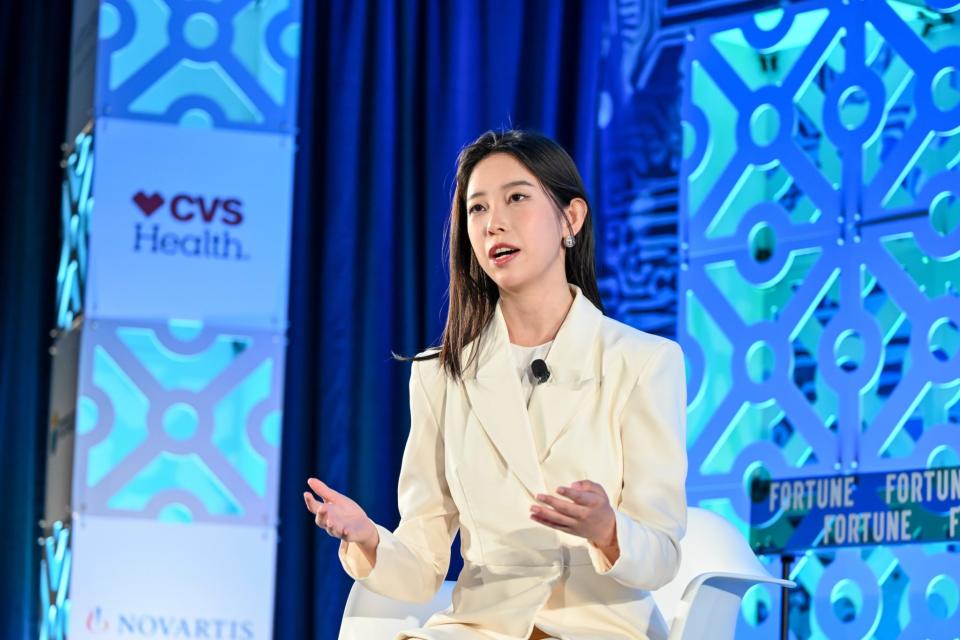This longevity scientist’s 3 surprising predictions for the growing industry of healthy aging

More people are taking extra steps to ensure optimal health as they age. That’s according to Alina Su, CEO of precision medicine and health tech company Generation Lab, at Fortune’s Brainstorm Health conference in Dana Point, Calif. last week.
“Everyone is trying to be healthier … People are paying more attention to internal health, rather than external beauty,” Su tells Fortune in an interview, in which she shared the launch of the company’s SystemAge test—part of its $149 a month membership fee.
SystemAge uses epigenetic blood tests, which evaluate how someone's lifestyle and environment affect their health. These tests calculate a person’s pace of aging and risk for health diseases across 19 organs and systems; Su hopes to give customers a launching pad toward optimizing their health by providing personalized lifestyle recommendations based on the data.
It’s all in the name of “Health care 3.0,” which Su says represents a shift from treatment to prevention and gives people the power to take control of their health, according to the company’s press release. Generation Lab joins a list of companies using data science and technology with the goal of extending health and life span.
Since launching her company last year, Su, who has researched aging and regeneration at Harvard Medical School and The Conboy Laboratory at UC Berkeley, has spoken to hundreds of doctors and thousands of consumers and entrepreneurs in the longevity space.
Here are her three predictions for the evolving longevity sector and the business of living longer:
1. More young people will join the longevity craze
Longevity clinics don’t just appeal to older adults. Su says their customers range from ages 20 to 70. “It’s not 40 plus. It’s 20 plus,” Su says of their average customer, who she says is often a young, healthy adult.
The interest in how data can determine health risks and give lifestyle recommendations has given way to a growing number of preventive health and longevity clinics emerging globally. When traveling to Dubai, Su saw beauty spas rebranded to longevity centers. After talking to numerous doctors, Su learned an estimated three to four new clinics are popping up in the city each month, attracting customers across generations. “There used to be aesthetic clinics that are now transforming to longevity practices,” Su says. “This was shocking.”
Public figures, many of whom influence the youngest generations, seem eager to lead the charge and take scans and tests to optimize their health. Last year, Kim Kardashian was outspoken about taking Prenuvo’s full-body MRI for internal, preventative health reasons on her social media, Su points out.
2. You don’t need to be a big-time biohacker to access longevity
Longevity has become synonymous with extreme—and expensive—biohacking, like entrepreneur Bryan Johnson, who takes dozens of supplements a day, has exchanged blood with his son (which is not recommended by the FDA), and spends millions of dollars a year to reverse his age.
“Anyone can be Bryan Johnson, they just don’t know how,” Su says.
Su believes that, with more data, people can get simple, low-cost lifestyle recommendations.
3. Expect more standards in the future
Today, anyone can market their business as a longevity clinic. There’s no certification to be considered a longevity doctor, and there are not enough standardizations in the field.
At a congressional meeting in March, Su advocated for research, clear definitions in the field, and regulatory markers as companies seek to put drugs on the market that aim to extend health span and reduce the risk of age-related diseases.
“How do you even assess if the drug on longevity is working or not? How can you even tell without a biomarker of aging that one’s working or not?” Su says. “Once we define a biomarker of aging, we can tell the efficacy, and then we can tell what's actually working.”
For more on how to live longer:
9 longevity experts share their best advice for creating healthy habits that can help you age well
Wealthy men are spending millions to lower their biological ages and live longer. These women are lowering their biological age with cheaper solutions
The longevity secrets of Singapore, the 6th blue zone city where people are living the longest, happiest lives
The strict anti-aging routine of a 45-year-old CEO who spends millions a year to be 18 again—from diet to exercise
This story was originally featured on Fortune.com

 Yahoo Finance
Yahoo Finance 